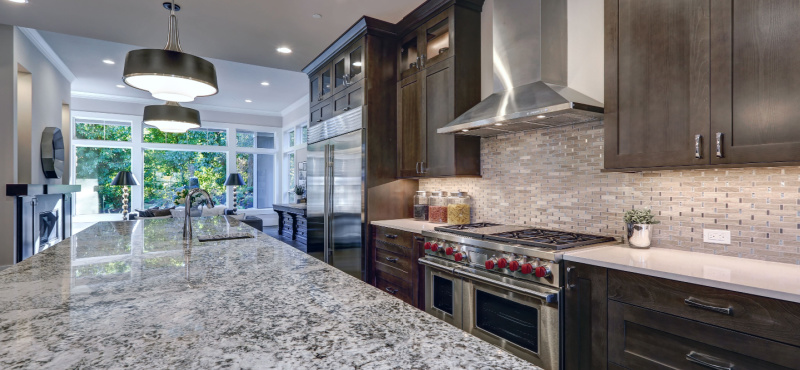Granite countertops are popular for their aesthetic appeal and durability, and learning about their sustainability and environmental impact can lend itself to a better understanding of this magnanimous stone. They are often touted as a sustainable and environmentally friendly choice over other alternatives so we decided to learn more about their potential benefits and drawbacks.
Granite is a natural stone, which means it is mined from the earth in large blocks, cut into slabs, and polished. Unlike synthetic materials, the production of granite countertops doesn’t involve the use of harmful chemicals or extensive manufacturing processes. Due to its chemical composition, it’s extremely durable and long-lasting leading to less maintenance over the years which adds to the sustainable nature of granite.
Energy Efficiency and Recyclability
Although the extraction, cutting, polishing, and transportation of granite is an energy-dependent process, modern technology and efficient machinery have helped reduce energy consumption in these processes. More importantly, granite is highly durable and requires minimal maintenance, making it energy-efficient in the long run as it does not need frequent replacements.
While granite itself is not biodegradable, it is a highly durable material that can be reused or repurposed in various ways. For instance, old granite countertops can be reworked into smaller tiles or used for other construction projects. Although granite itself is not typically recycled in the same way as materials like glass or metal, it can be repurposed or crushed for use as gravel or aggregate in construction projects.
An Eco-Friendly Way to Enhance Aesthetics
Granite is a natural material that does not require any synthetic or chemical additives to produce. It is also non-toxic and does not emit harmful volatile organic compounds (VOCs), formaldehyde, or radon. They can be found in several colors, textures, and designs, and can go a long way to enhance the aesthetics of your bathroom, bar, kitchen, outdoor patio, and more. Moreover, granite countertops are easy to clean and maintain, as they do not harbor bacteria or dust. You can use mild soap and water or vinegar to wipe them down, which avoids the use of harsh chemicals.
Granite countertops are versatile and can be used in various kitchen types, adding both beauty and functionality to the space. Be it a traditional style kitchen with classic cabinetry and accessories or a luxury kitchen with state-of-the-art appliances, granite can enhance the aesthetics of any style of kitchen.
Other Benefits of Granite Countertops
- Heat Resistance: Granite exudes high resistance toward heat, making it a lucrative choice for kitchen countertops. It can withstand hot pans and pots without sustaining damage, offering a practical and functional surface for cooking and baking.
- Hygienic Surface: Granite countertops have a non-porous surface when properly sealed, which prevents the growth of bacteria and molds. This feature makes granite a hygienic option for kitchen and bathroom surfaces.
- Versatility: Granite can be used for various applications, including countertops, backsplashes, and kitchen islands. Its versatility allows for seamless integration into different design styles and layouts.
- Longevity: With proper care and maintenance, granite countertops can last for many years, making them a cost-effective and durable investment for homeowners.
The Best Granite Countertops for Your Kitchen
In the world of interior design, the enduring appeal of granite countertops remains unparalleled. As a cornerstone of our homes, these natural stone surfaces not only elevate the aesthetics of our living spaces but also embody durability, functionality, and timeless elegance. This is why working with reputable granite dealers is imperative when sourcing these stones for your home or commercial space. At Tops Kitchen Cabinet, we not only have the best granite countertops on the market, but we also provide cabinets, accessories, and more. Call us today to get your quote!

